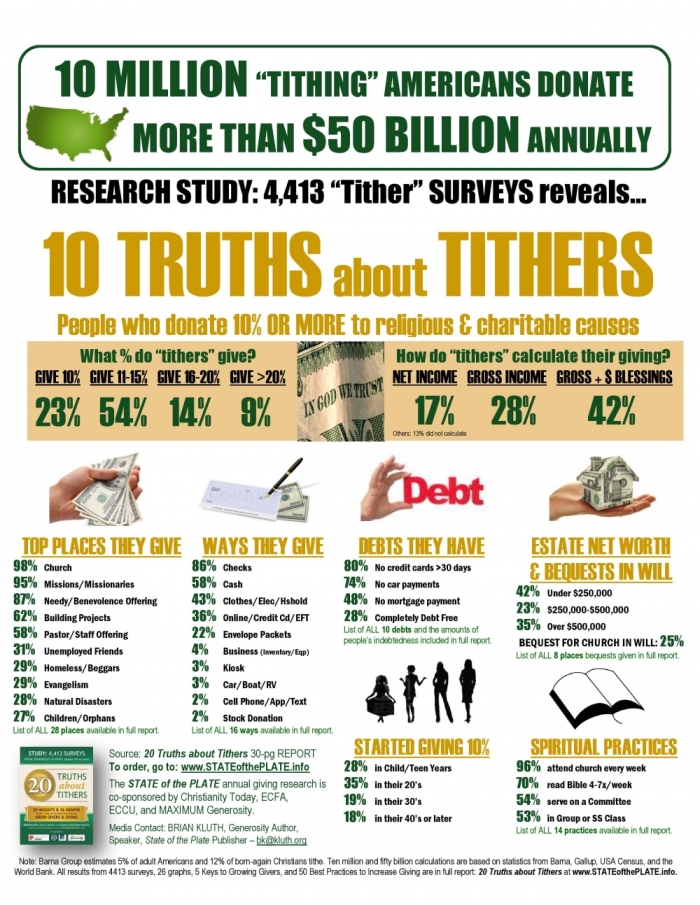Study: Christians Who Tithe Have Healthier Finances Than Those Who Don't
The finances of Christians who tithe are generally healthier than the finances of those who do not, according to a new report that takes a close look at the financial, spiritual and giving practices of people who give 10 percent or more of their income away to churches and charities each year.
Researchers compared tithers to non-tithers using nine financial health indicators, and found that tithers were better off in every category. Among tithers, for example, 80 percent have no unpaid credit card bills, 74 percent don't owe anything on their cars, 48 percent own their home and 28 percent are debt free.
"The weird thing is, a tither looks at that and says to himself, 'Well I'm better off because I give.' A non-tither looks at that and says, 'Oh, they give because they're better off,'" said Brian Kluth, founder of the study and Maximum Generosity, who called the findings "unprecedented."
There are an estimated 10 million Christians in the U.S. who tithe more than $50 billion annually, according to a press release for the annual State of the Plate report. The report encompasses survey responses from 4,413 tithers from all 50 states and a variety of different churches and income levels.
The fifth annual study reveals that 97 percent of tithers make giving to their local church a priority, and 63 percent started tithing between their childhood and their twenties. It also found that 70 percent give based on their gross income rather than their net income, and 77 percent give more than the traditional 10 percent.
"Never before has this group been studied, and I think for every pastor and church leader and parachurch leader it would be valuable if they understand this," Kluth told The Christian Post. "We're in the midst of a 40-year decline in the percentage that Christians give, and we need to see a generosity movement in America, that Christians re-embrace generosity as a spiritual value, but not for the sake of the church budget, but because of the Bible. Churches have made giving all about the budget, and it's not about the budget, it's all about the Bible."
Kluth started conducting State of the Plate studies five years ago in part because he wanted to help the media present accurate information regarding church giving. For the first four years the research focused primarily on church giving trends, he says, but this year's focus on individuals who tithe is unique.
"Without this group of givers, most churches would cease to exist within months," he said.
The "saddest" result of the survey, he says, was discovering that few tithers have included giving to churches and charities in their estate plans.
Tithers make up between just five and 20 percent of the givers in a typical congregation, but they donate 50 to 80 percent of the money. Among non-tithing Christians who struggle to give, 38 percent say it's because they can't afford it, 33 percent say they have too much debt and 18 percent say their spouse doesn't agree with tithing.
Tithing is an Old Testament concept, and Kluth says the New Testament approach to giving is "giving proportionately and giving voluntarily." Even those who have fallen on hard financial times can contribute to their churches, he says.
"The Scripture tells us to give from what we have," said Kluth. "That is a biblical mandate. There are some seasons of our lives we have less than others, and so when you experience a downturn financially you don't stop giving, you give a proportion of what you have...I always like to say, you don't give to get, you give because you've received something already. You give because you've already gotten something from God."
The complete 27-page report, titled "20 Truths about Tithers," is available on the State of the Plate website. The research was led by Maximum Generosity and was co-sponsored by ECFA, Christianity Today and Evangelical Christian Credit Union.
Here is an infographic that shows some of the study's findings:





























